Sabah Bint Ali Bin Amer
Department of Geography - College of Arts Princess Nourah Bint Abdulrahman University, Ryadh, Saudi Arabia
Correspondence to: Sabah Bint Ali Bin Amer, Department of Geography - College of Arts Princess Nourah Bint Abdulrahman University, Ryadh, Saudi Arabia.
| Email: |  |
Copyright © 2022 The Author(s). Published by Scientific & Academic Publishing.
This work is licensed under the Creative Commons Attribution International License (CC BY).
http://creativecommons.org/licenses/by/4.0/

Abstract
The COVID-19 pandemic has affected many aspects of the lives of the world’s population. However, food is the most important commodity in all world markets, regardless of their size and location. Therefore, this study examined the impact of COVID-19 on imported food commodities between January 2019 and January 2020. The results of the study showed a decrease in the values of imported goods and a multiplicity of export destinations to Saudi Arabia. The Saudi government also made efforts to support citizens and residents through several systems, some of which were included in the study.
Keywords:
Economic impact, Economic development, Food commodities, Economic growth
Cite this paper: Sabah Bint Ali Bin Amer, The Economic Impact of the Emerging COVID-19 Pandemic on the Kingdom Case Study: Values of Imported Food Commodities Compared Between January 2019 and January 2020, International Journal of Advanced and Multidisciplinary Social Science, Vol. 7 No. 1, 2022, pp. 1-10. doi: 10.5923/j.jamss.20220701.01.
1. Introduction
The Kingdom of Saudi Arabia (KSA) participates considerably, with commercial relations with most countries all over the world. The Kingdom’s population size was 35 million in 2020, with many living in urban centres providing basic services and infrastructure, including commercial centres, to meet the increasing demand for consumer goods, especially food, of the growing population of such rapidly expanding urban centres.The study of the economic impact of the emerging COVID-19 pandemic on imported food commodities is a kind of analytical study in economic geography that usually seeks to investigate economic activity with specific spatial and temporal frameworks. Such a study may involve considering changes in economic activity and identifying the underlying reasons Such as an increase in the volume of consumption of a commodity or a decrease in the volume of production. Also, it may investigate the role and contribution of this activity in local or global economic development or determine the challenges that may be faced. Generally, such studies can assist in planning new activities or supporting the sustainability of existing ones.In response to COVID-19, like many other countries, the KSA has made a great effort (Kingdom of Saudi Arabia, 2020, the Kingdom facing Corona) to reduce its economic implications. Among other economic implications of COVID-19, many countries worldwide suffer from a gap between supply and demand, which was manifested, in commodity-exporting countries, in a decrease in the marketing price of goods because of the high volume of inventory. This can be exaugurated by a potential decline in the demand for many food commodities, and a decrease in their price in international markets, which negatively affects the producers of these commodities. In contrast to commodity-exporting countries, the gap was manifested in commodity-importing countries in an increase in price due to increasing demand for goods that could not be fulfilled by limited supply. Moreover, the economic implications of COVID-19 included the increased costs of storage and transportation in addition to the insurance tax.In this context, the Food and Agriculture Organization (FAO) reported a decline in the global price index for basic food commodities. The price of sugar fell to 14.6 dollar in April compared to March 2020, the lowest in the past 13 years. The reason is a decrease in the world price of oil, and an increase in the volume of the export supply of sugar. The decrease in the demand for vegetable energy also led to a decrease in the price of vegetable oils. Its price index decreased in April 2020 by 5.2% from what it was in March. The index also decreased for powdered milk and butter products by more than 10%, dairy products by 3.6%, and meat products by 2.7%. The recurrence of this problem in several countries worldwide will inevitably affect the economic cycle of food commodities at the global level. These complicated implications were reported by the Organization for Trade and Development (UNCTAD) reporting that China’s total imports would decrease by 25% in 2020. This, in turn, led to an economic crisis for commodity-exporting countries with relationships with China, which represent about two-thirds of developing world countries. In this respect, it is worth mentioning that the economic impact of the COVID-19 pandemic shows the strength of the link between the economies of many countries of the world, especially Asian countries, with the Chinese economy forming 19% of the world economy in 2020. This implies that any decline in the growth of China’s economy will negatively affect the economies of those countries (Global Economic News, 2020).Generally, it can be argued that the extent and magnitude of the economic implications of COVID-19 in commodity-importing countries are usually determined by the scope of their goods’ origins.The current study is intended to assess the impact of the COVID-19 pandemic on the Kingdom’s imports of food commodities in terms of values, types and import destinations and to assess the efforts made by the KSA in reducing the economic effects of COVID-19.
2. Previous Studies
The economic implications of COVID-19 have been repeatedly considered in many research works. In this context, numerous studies have dealt with the economic repercussions of COVID-19 in different countries. For instance, Manjula Bai (2020) evaluated the restrictions imposed by COVID-19 on income levels, Gross Demotic Product (GDP), investment rates, and consumption patterns. Also, the author explored the role of the government in sustaining living conditions under the COVID-19 pandemic (Manjula Bai, 2020). Rasoul (2021) also considered COVID-19 challenges to agricultural activities and livelihoods in rural areas. Lahiri and Sinha (2021) studied the impact of COVID-19 on the pattern of individual consumption. In this respect, it has been argued that among the most important repercussions associated with COVID-19 is the increase in demand for foodstuffs (Nicolas, 2020).As an example of studies that considered COVID-19 economic implications in the KSA, Afana examined the impact of COVID-19 on some economic sectors in the KSA, particularly the banking, communication, transportation, and petroleum sectors (Afana, 2020). The study revealed that the demand for loans granted by banks to the business sectors increased considerably because of the COVID-19 pandemic. Similarly, Mansour (2021) investigated the negative consequences of COVID-19 on economic development in the KSA, considering the 2030 vision, with particular emphasis on the tourism sector. It was also found that tourism revenues declined for 2020 by an average of 50% compared to 2019 (Mansour & Najeh, 2021).Generally, it can be argued that despite the variety of studies that considered the impacts of the COVID-19 pandemic on economic activities, none of these studies explored the implications of COVID-19 on foreign trade in the KSA in general, and food commodities in particular.
3. Results
The impact of COVID-19 on the Kingdom’s imports of food commodities can be assessed through four elements: first, assessing the change in the value of imports because of the pandemic; second, evaluating the values and types of the Kingdom’s imports of food commodities for the months of January 2019 and January 2020; third, the geographical distribution of the scope of the marketing of goods exported to the KSA; and fourth, examples of the Kingdom’s efforts to support society in Saudi Arabia socially and economically.Assessing the change in the value of imports because of the pandemicThe total value of the Kingdom’s imports during 2020 amounted to about 517.5 billion Saudi riyals, and Asian countries ranked first in terms of the value of imports to the Kingdom, as the value of the Kingdom’s imports from Asian countries amounted to about 215.2 billion riyals, which constituted about 41.8% of the total value of imports. European countries ranked second, with 27% of the total value of imports, while the Kingdom’s imports from the Arab countries accounted for about 13.1% of the total value of imports, followed by North American countries, with 12.7%. As for the rest of the world regions represented in African countries, Australia, New Zealand, and Latin American countries, the value of the Kingdom’s imports from them amounted to about 5.3% of the total value of imports in 2020 (Table 1, Figure 1, and Map 1).Table 1. Evolution of the value of imports in the Kingdom from different regions of the world during the period from 2017–2020
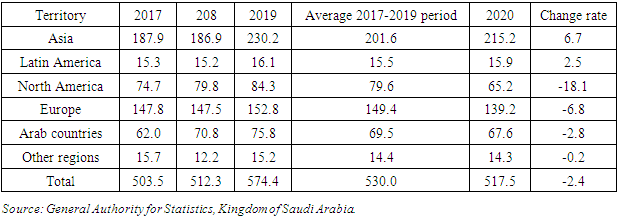 |
| |
|
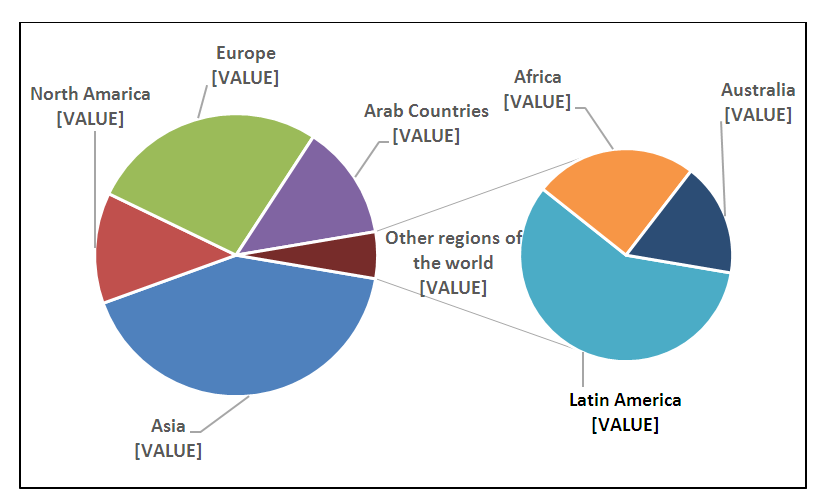 | Figure 1. The relative distribution of the value of the Kingdom’s imports from the different regions of the world in 2020 (Source: Prepared by the researcher based on the data in Table 1.) |
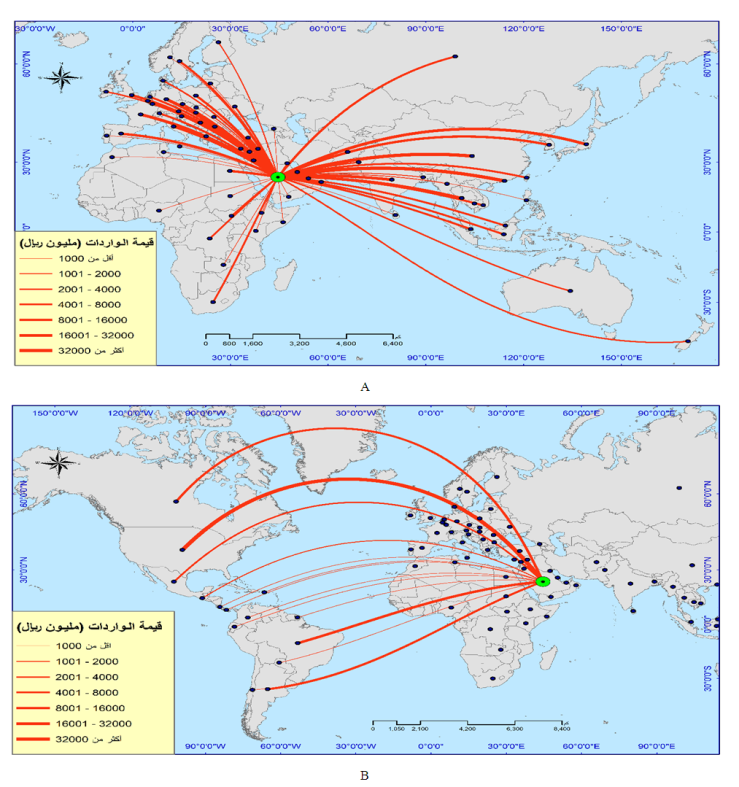 | Map 1. The geographical scope of the Kingdom’s imports in 2020 from the countries in the eastern half (A) and the western half (B) of the world (Source: Prepared by the researcher based on the data of the General Authority for Statistics, Kingdom of Saudi Arabia.) |
To track the impact of the COVID-19 pandemic on the volume of imports, it was necessary to compare the value of imports with the average of the three years preceding the pandemic and extend between 2017–2019, as it became clear despite the varying value of imports from one year to another. The average value of the Kingdom’s imports during that period amounted to 530.0 billion riyals (Table 1).As a result of this comparison, it became clear that the value of the Kingdom’s imports in 2020 recorded a decrease of 2.4% compared to the average value of imports for the period 2017–2019.From tracking the numbers in Table 1 and Figure 2, we can see the following:• The value of the Kingdom’s imports from Asian and Latin American countries recorded a noticeable increase during 2020 compared to previous years, reaching 6.7% and 2.5% for each, respectively.• The value of the Kingdom’s imports in 2020 decreased considerably compared to the period prior to the COVID-19 pandemic from North American countries, and the percentage of decline in the value of imports was about 18.1%.• The value of the Kingdom’s imports from European and Arab countries witnessed a lesser decline during the same period, amounting to about 6.8% and 2.8% in each of them, respectively.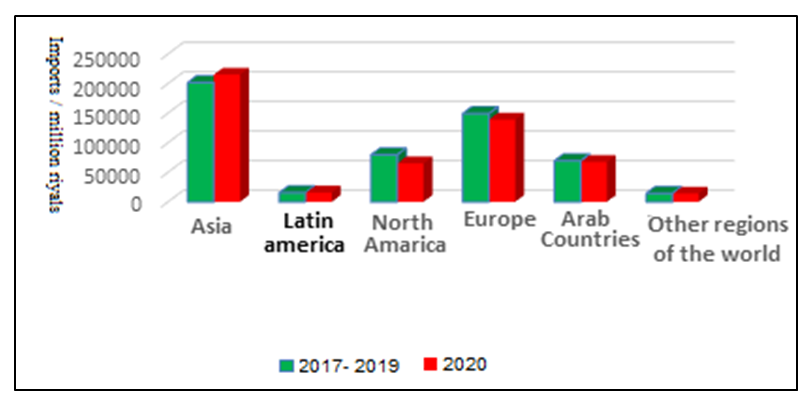 | Figure 2. The total value of the Kingdom’s imports from different regions of the world in 2020 compared to the average period prior to the COVID-19 pandemic, extending between 2017–2019 (Source: Prepared by the researcher based on the data in Table 1.) |
It is clear from the previous presentation that although the total value of imports decreased in 2020 compared to the average value of imports in previous years, the percentage change did not exceed 2.5%. The disparity in the direction of change in the value of the Kingdom’s imports from different regions of the world is also evident.Assessment of the value and type of the Kingdom’s imports of food commodities for the months of January 2019 and 2020It is evident from tracking the numerical and qualitative composition of the prices of imported food commodities to the Kingdom for the months of January 2019 and January 2020 that a decline in the import values of food commodities was seen in the month of January 2020 compared to the import values of the same type of food commodities for the month of January of the previous year (Table 2 and Figure 3). For example, it was noted that the highest decrease was recorded in the case of vegetable imports, which decreased by about 870%. This was followed by processed foods and live animals and animal product imports, which decreased by 642.3% and 525.2%, respectively, during the same period. This may indicate the economic impact of the pandemic on the prices of goods for the final consumer. In addition to a decrease in the quantities imported due to the quarantine measures.Table 2. The numerical and qualitative distribution of the values of imported food commodities for the Kingdom for the months of January 2019 and January 2020/million riyals
 |
| |
|
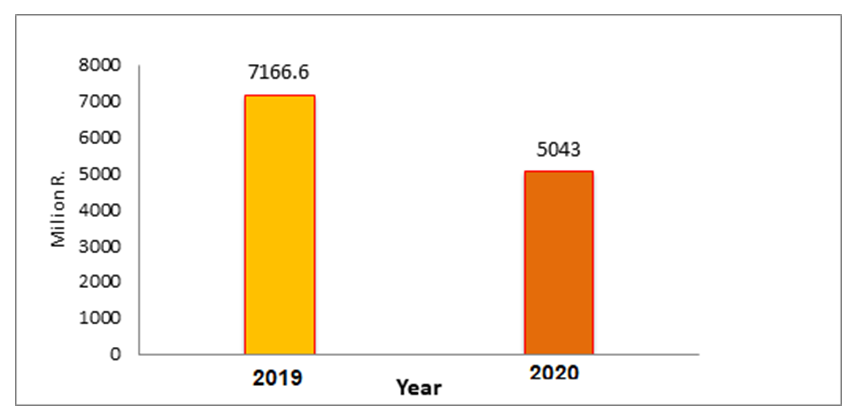 | Figure 3. Total values of imported food commodities to the Kingdom for the years 2019 and 2020/ million riyals (Source: From the researcher’s work based on the data in Table 2.) |
However, the relative distribution of the values of the types of commodities did not show a slight difference between the months of January for the two years. It is noticeable that the value of imports of various types of food commodities declined during the study period, with an average of about 29.6% (Fig. 3). However, the slightest decline was witnessed by the first group of those commodities, which include medicinal liquids, due to the increase in demand for them considering delinquency (Table 1).This is due to the lack of data on the volume and quantity of all imports of food commodities imported is into the Kingdom in 2020. Figure 4 indicates that there is a slight decrease in the volume of imports, and if any, it does not cause a shortage of food commodities available for consumption in the Saudi market. The followers of Saudi markets do not find an economic separation between imported or local food commodities.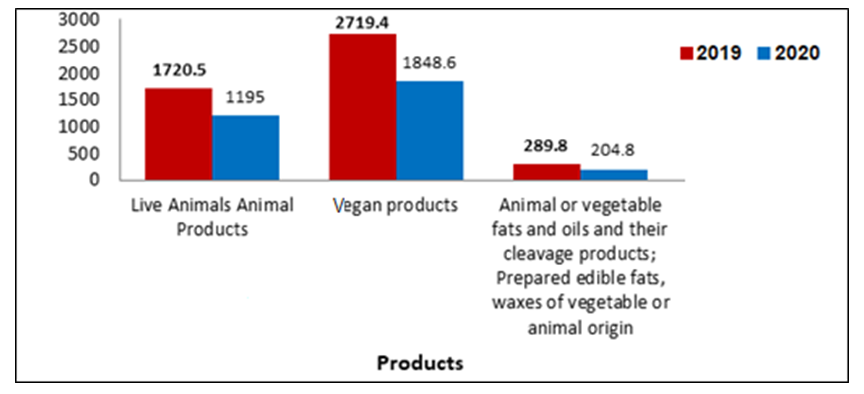 | Figure 4. The numerical and qualitative distribution of the values of imported food commodities to the Kingdom for the years 2019 and 2020/million riyals (Source: From the researcher’s work based on the data in Table 2.) |
In global trade, the values of imported goods decrease with a decrease in the volume of global demand for them, and as is observed globally; one of the economic impacts of the COVID-19 pandemic is a rise in the prices of goods for the final consumer, offset by no rise in individual income, but rather a decrease in income, or its cessation. Meanwhile, the Saudi government supported the local market by providing food commodities. To sustain economic activity in the shopping process, many systems and strategies have been enacted to support the local production of food commodities. There is a certain pattern of consumption. It meets the needs of the consumer on the one hand and ensures the continuity of the economic cycle of production on the other. Among the positives of the repercussions of the COVID-19 pandemic is that the decline in import values contributes to reducing the Saudi trade deficit balance. Awareness campaigns guiding consumption and precautionary seizures contributed to the concentration of citizens’ purchases on basic commodities.Once again, the decline in the import values of food commodities for the month of January 2020 can be explained by the home quarantine, which affected the volume of consumption of restaurant sales in all countries of the world, and thus a decrease in the percentages of the need for food commodities. At the same time, the quarantine had a clear economic impact on the income levels of individuals due to loss of jobs. his undoubtedly directly affected their purchasing power and demand food commodities. This consequently affects the volume of imports of goods.Geographical distribution of the scope of marketing of goods exported to the KSADue to the existence of standards required by the Food and Drug Authority in the KSA for the facilities of the countries exporting food commodities to them, establishments must follow the requirements in foods of animal or vegetable origin for chemical residues, hormones, and other prohibited substances.It was noted that the scope of imports’ origin is wide and diverse (Maps 2, 3, and 4). This consequently meets the diversity of consumers’ desires, and their income levels and thus supports food security in KSA under the COVID-19 pandemic.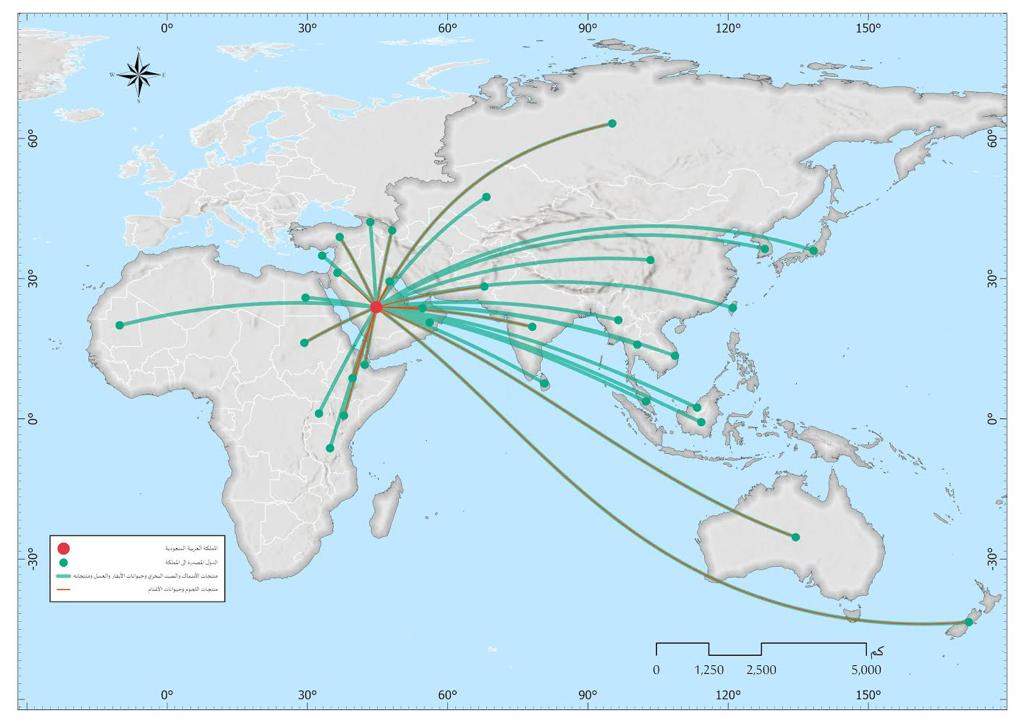 | Map 2. The geographical scope of the movement of imports of fish products, cows, and honey for the Kingdom in 2020 from the countries of the eastern half of the world (Source: Prepared by the researcher, according to Table 3.) |
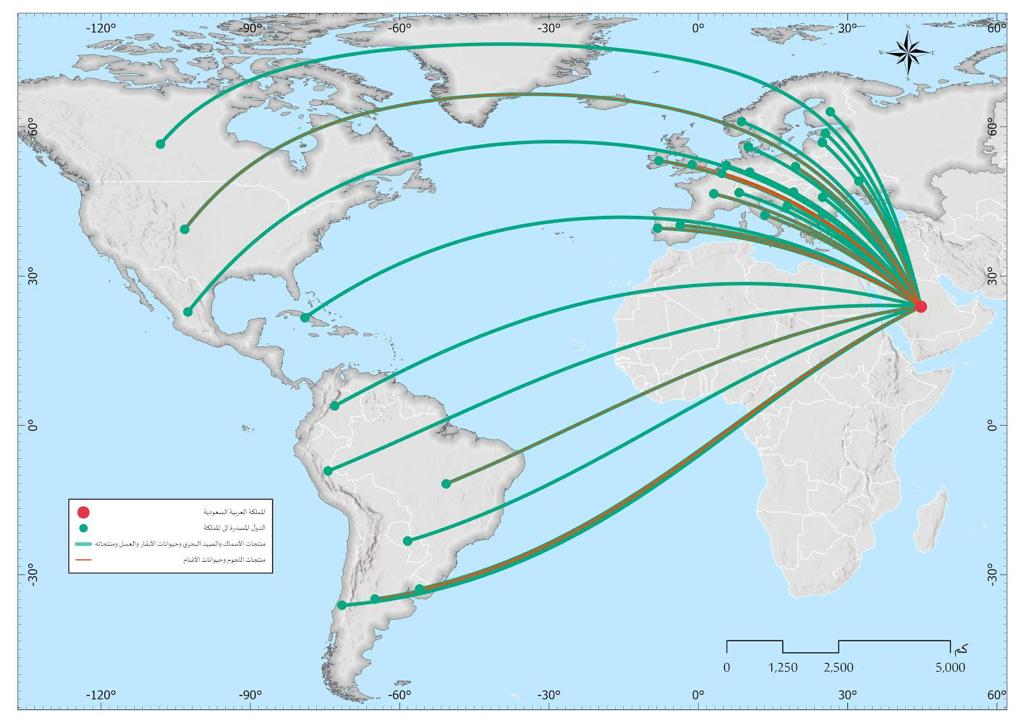 | Map 3. The geographical scope of the movement of imports of fish products, cows, and honey for the Kingdom in 2020 from the countries of the western half of the world (Source: Prepared by the researcher, according to Table 3.) |
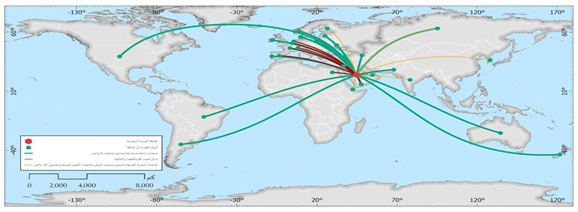 | Map 4. The geographical scope of the movement of imports of agricultural products, poultry, and poultry products for the Kingdom in 2020 (Source: Prepared by the researcher, according to Table 3.) |
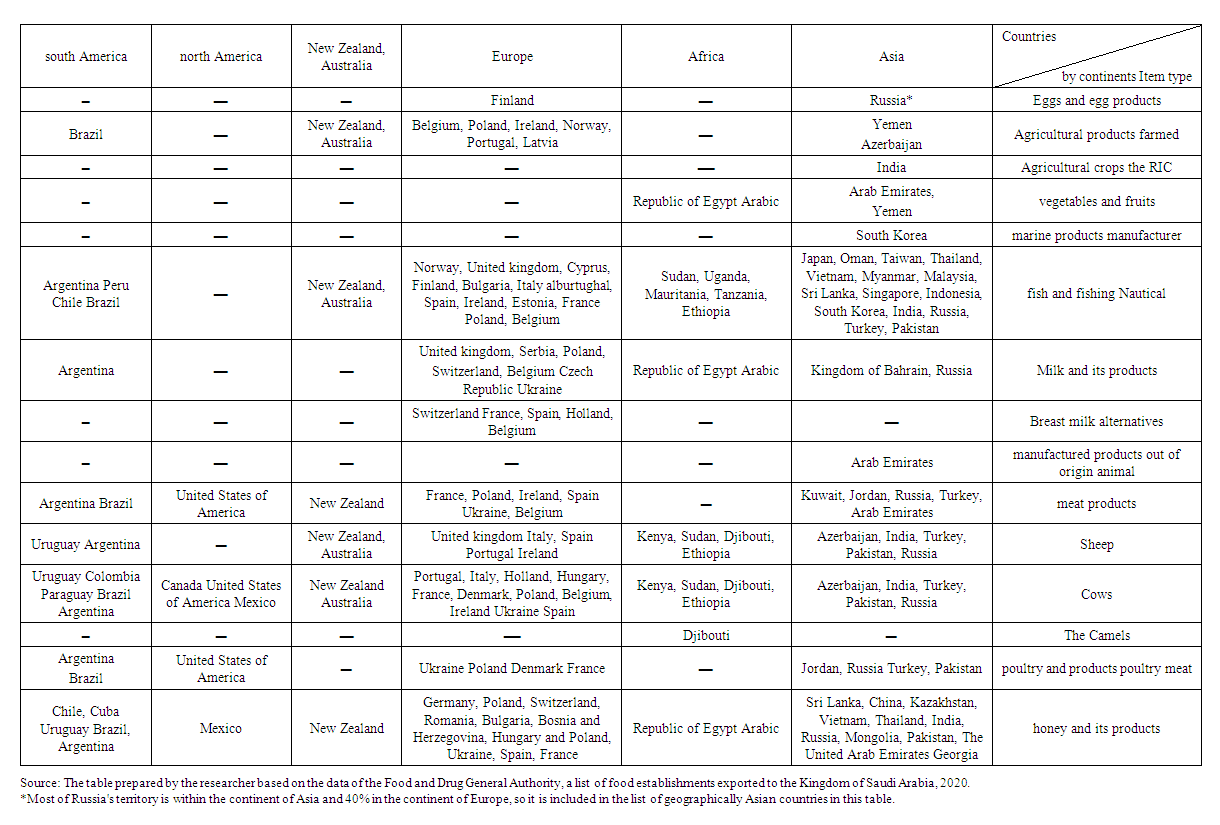 | Table (3). The geographical scope of marketing food commodities that are allowed to be exported to the Kingdom of Saudi Arabia 2020 |
There is no doubt that achieving food security in the KSA is a result of the integration of the Saudi economic and political systems in their support for foreign trade to provide the services required for society despite the global economic crisis with the COVID-19 pandemic, at a time when the international media is showing the suffering of food shortages among many peoples of the world, rich and poor alike.The Saudi Food and Drug Authority plays a crucial role in assuring that imported food commodities meet the applied safety and health standards during the COVID-19 pandemic.Examples of the kingdom’s efforts to support society in Saudi Arabia socially and economicallyThe KSA ranked first among the countries in response to the COVID-19 pandemic. Due to huge efforts undertaken by the government to mitigate the effects of the COVID-19 pandemic in terms of health and economy, the KSA has become one of the least vulnerable countries to COVID-19 implications. The following are some of the Kingdom's efforts to achieve health and economic security for Saudi citizens.• The Zakat and Income Authority provided various facilities, including facilitating zakat and tax procedures, in line with the directives of the International Monetary Fund. These included suspending the imposition of fines, postponing the submission and payment of tax returns, taxes due on import, and accepting installment payments for the amount due to the Zakat Authority without being restricted to a specific amount, and preparing a program of about 50 billion riyals to mitigate and combat the effects of the virus on the private sector.• By order of the Custodian of the Two Holy Mosques and through the Saand system, the government bears 60% of the salaries of Saudi private sector employees in the affected facilities.• Preventing residents from leaving their areas by determining daily roaming hours.• Suspending attendance at workplaces in government agencies, closing markets and malls, and requiring companies and institutions to apply home quarantine for 14 days for expatriate workers.• Restricting service in restaurants and cafes to take-out orders.• By order of the Custodian of the Two Holy Mosques, free treatment services were provided to all people infected with COVID-19, including citizens, residents, and illegal residents.• In compliance with the directives of the Custodian of the Two Holy Mosques, extending the identity of “residence permits” for foreign residents inside and outside the Kingdom without charge.• Supporting, exempting, and expediting the payment of the dues of the private sector.• The Kingdom announced its contribution of $500 million to support international efforts to address the coronavirus pandemic.• Requiring companies and institutions days for expatriate workers to adhere to home quarantine for 14 days.• Suspension of events in wedding halls, restrooms, and hotels.• Suspension of international flights and private sports centre events.• Health precautionary measures and emergency plans were submitted by all sectors of the country along with several cultural and awareness-raising programs. Community services provided free services, such as sterilizers, jumpers, and masks.Of the examples presented above of the efforts of the Saudi government to support Saudi society, the path of the study can be classified into two groups. The first is directly concerned with the economic field and has an impact on income and purchasing ability, such as supporting the Zakat and Income Authority by canceling fines, tax exemptions, and an amount of 50 billion riyals to support the private sector, and the Sandi system, which is based on the government bearing 60% of the salaries of Saudi private sector employees in the affected establishments.Services in restaurants and cafes were limited to take-out orders, and daily roaming hours were established. Such systems have an interactive relationship with the volume of domestic demand for food commodities, affecting the volume of imported goods from foreign markets. The second group was concerned with combating the spread of the virus and preserving the health of community members, which has an indirect economic impact, such as supporting the Kingdom with its contribution of $500 million to support international efforts to address the pandemic. This included the suspension of events on rented premises and international flights. Free treatment services were provided to all patients with COVID-19, including citizens, residents, and illegal residents.
4. Conclusions
A discussion of the study’s elements revealed a decline in the import values for the month of January 2020 compared to January 2019. Despite this decline in the scope of the foreign markets, the Kingdom’s exporting countries did not witness a noticeable contraction, which calls for rejecting the hypothesis of the narrow scope of the openness of foreign markets to the Saudi domestic market. Table 2 shows the large number of foreign establishments from different countries on the world’s continents, which export various food commodities to the Kingdom. This confirms the breadth and vitality of the Saudi local market, and the sustainability of its economic development. The study also noted the success of the strategy followed by the Saudi government to confront the emerging COVID-19 pandemic, as it included the areas of social, economic, and environmental life. A variety of services were provided to citizens and residents in Saudi Arabia, especially in terms of health and with attention paid to all aspects of life, in line with the achievement of Vision 2030 in achieving sustainability. Various initiatives have been implemented to mitigate the effects of the COVID-19 pandemic, especially what it offers in the health and economic fields. To become one of the countries in the world with the least COVID-19 deaths, the Kingdom ranked first among the countries in the world in the response of the government and entrepreneurs to the pandemic. In the same vein, this research study recommends the following suggestions:• Continuing to activate the individual’s role in achieving Vision 2030 in economic growth based on non-oil resources.• Continuing awareness efforts to modify the consumption pattern by all groups and institutions, especially voluntary and media ones, and the consumption of food commodities while supporting local products.• Paying attention to the quality of the local product to bring in an additional source of income from the local and foreign market.• Domiciliation of professions that support local production in the field of production and marketing of food commodities.• Motivating Saudi youth through several incentives to work in the field of food commodities production, which represents raw materials for food manufacturing and providing good health, and retirement insurance.• Establishing training institutes, such as training institutes on marine fishing and marketing methods.
References
| [1] | Afana, M. (2020). The impact of the corona pandemic (COVID-19) on the Saudi banking sector. International Journal of Economics and Business, 9, 2, 198–210. |
| [2] | Al-Doshi, B. (2020). Saudi Arabia is among the countries with the lowest number of corona deaths. Bloomberg Agency, Washington, Al-Arabiya. Retrieved on July 24, 2001. Available at https://www.alarabiya.net/. |
| [3] | Al-Fazi, M. (2021). The emerging corona (Covid-19) in rental contracts: A systematic jurisprudential study. Taif University Journal for Human Sciences, 25, 454–535. |
| [4] | Al-Juhani, A. (2021). The impact of corona on obligations in the commercial contract. Taif University Journal for Human Sciences, 25, 575–620. |
| [5] | General Authority for Statistics (2021). International trade [Online]. Riyadh: General Authority for Statistics, KSA. Available at www.stats.gov.sa/ar/325. |
| [6] | Global Economic News (2020). Global food commodity prices fell by 10% during the pandemic: The demand contraction hits the sector. The Economic Newspaper, Riyadh. |
| [7] | Kingdom of Saudi Arabia (2020a). The Kingdom facing corona: A report summarizing the government’s efforts to combat the spread of the new Corona virus. Ministry of Information. Available at https://www.media.gov.sa/ar/news/2623. |
| [8] | Kingdom of Saudi Arabia (2020b). List of food establishments exporting to the Kingdom of Saudi Arabia, Food and Drug General Authority. Retrieved on 5/7/2021. Available at https://old.sfda.gov.sa/ar. |
| [9] | Lahiri, S., & Sinha, M. (2021). A study of the socio-economic implications of the COVID-19 pandemic. Australasian Accounting Business and Finance Journal, 15, 51–69. |
| [10] | Manjula Bai, H. (2020). The socio-economic implications of the coronavirus pandemic (COVID-19): A review. ComFin Research, 8, 8–17. |
| [11] | Mansour, A., & Najeh A. (2021). The impact of the economic repercussions of the novel coronavirus (COVID-19) on economic development in the Kingdom of Saudi Arabia in the light of Vision 2030: Tourism Sector as a Model. Taif University Journal for Humanities, 25, 621–689. |
| [12] | Mihalic, T. (2014). Tourism and economic development issues. Contemporary Economic Growth Models and Theories: A Literature Review, 760. |
| [13] | Nicola, M., Alsafi, Z., Sohrabi, C., Kerwan, A., Al-Jabir, A., Iosifidis, C., Agha, M., & Agha, R. (2020). The socio-economic implications of the coronavirus pandemic (COVID-19): A review. Int J Surg, 78, 185–193. |
| [14] | Rasul, G., Nepal, A. K., Hussain, A., Maharjan, A., Joshi, S., Lama, A., Gurung, P., Ahmad, F., Mishra, A., & Sharma, E. (2021). Socio-economic implications of COVID-19 pandemic in South Asia: Emerging risks and growing challenges. Front Sociol, 6, 629693. |
| [15] | The Saudi Press Agency (2021). The kingdom of first in the world in the response of the government and entrepreneurs to the Corona pandemic. Retrieved on July 24, 2021. Available at https://www.alriyadh.com/theme2/imgs/logo.png. |
| [16] | United Nations News, February 12, 2020, concerns about the impact of the Corona virus on the global economy as the World Health Organization tries to coordinate clinical trials to create a treatment for people infected with the virus (COVID-19), the United Nations. Retrieved on 6/19/2020, Available at https://news.un.org/ar/story/2020/02/1049201. |







 Abstract
Abstract Reference
Reference Full-Text PDF
Full-Text PDF Full-text HTML
Full-text HTML





